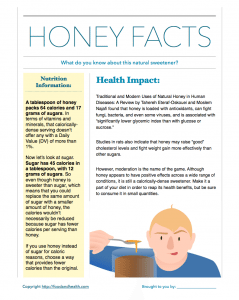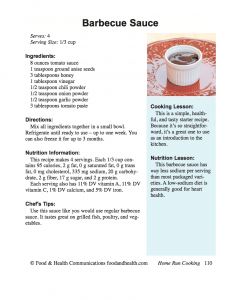Fact Sheet: Honey
You know how much I love getting requests from you, right? I just couldn't resist this one, which came from a longtime reader of Food and Health...
Hi Judy,
Everyone thinks honey is a health food and ignore the fact that it too is an added sweetener. Any thoughts on doing a fact sheet on honey? I could sure use some information for a magazine article coming up! Can you help? Thanks!
Debbie ******Retired Nutrition Agent
My team and I were intrigued by this request, and given that Debbie needed the information for an upcoming deadline, we knew we had to spring into action. Here's what our research revealed... Honey Fact SheetWhat do you know about honey? Many people tout it as a miracle food that can help trim waistlines and cure allergies, but does science back up these claims? It's time to take a closer look at this sweetener!The Nutrition Information:A tablespoon of honey packs 64 calories and 17 grams of sugars. In terms of vitamins and minerals, that calorically-dense serving doesn't offer any with a Daily Value (DV) of more than 1% (and that's only one vitamin: manganese).Now let's look at sugar. Sugar has 45 calories in a tablespoon, with 12 grams of sugars. So even though honey is sweeter than sugar, which means that you could replace the same amount of sugar with a smaller amount of honey, the calories wouldn't necessarily be reduced because sugar has fewer calories per serving than honey. If one makes a substitution of honey for sugar for caloric reasons, one must be careful and make sure that the substitution is done in a way that provides fewer calories than the original.But the nutrition information isn't the only thing that's worth noting about honey. Let's take a closer look at its impact on health.
Honey Fact SheetWhat do you know about honey? Many people tout it as a miracle food that can help trim waistlines and cure allergies, but does science back up these claims? It's time to take a closer look at this sweetener!The Nutrition Information:A tablespoon of honey packs 64 calories and 17 grams of sugars. In terms of vitamins and minerals, that calorically-dense serving doesn't offer any with a Daily Value (DV) of more than 1% (and that's only one vitamin: manganese).Now let's look at sugar. Sugar has 45 calories in a tablespoon, with 12 grams of sugars. So even though honey is sweeter than sugar, which means that you could replace the same amount of sugar with a smaller amount of honey, the calories wouldn't necessarily be reduced because sugar has fewer calories per serving than honey. If one makes a substitution of honey for sugar for caloric reasons, one must be careful and make sure that the substitution is done in a way that provides fewer calories than the original.But the nutrition information isn't the only thing that's worth noting about honey. Let's take a closer look at its impact on health. Health Impact:There is some truly fascinating research about honey out there.One study, Honey: Its Medicinal Property and Antibacterial Activity, was authored by Manisha Deb Mandal and Shyamapada Mandal. This study explored the use of honey in medicine, analyzing its surprising antibacterial activity. Beginning with the historical uses of honey, the authors noted, "Indeed, medicinal importance of honey has been documented in the world’s oldest medical literatures, and since the ancient times, it has been known to possess antimicrobial property as well as wound-healing activity." But do its properties stand up to rigorous scientific testing?The answer is yes.In addition to being dubbed, "a very promising topical antimicrobial agent against the infection of antibiotic-resistant bacteria" (source), honey also appears to be effective against bacterial pathogens when ingested. According to the study, "The growth of bacterial species that cause gastric infections, such as S. typhi, S. flexneri and E. coli, are inhibited by Tualang honey at the low concentrations. The Tualang honey has been reported to be effective against E. coli, S. typhi and S. pyogenes[...], and thus, when taken orally in its pure undiluted form, this honey may help speed up recovery from such infections. Honey is effective when used as a substitute for glucose in oral rehydration and its antibacterial activity shortened the duration of bacterial diarrhea." (Tualang honey is a Malaysian type of honey explored in the research).
Health Impact:There is some truly fascinating research about honey out there.One study, Honey: Its Medicinal Property and Antibacterial Activity, was authored by Manisha Deb Mandal and Shyamapada Mandal. This study explored the use of honey in medicine, analyzing its surprising antibacterial activity. Beginning with the historical uses of honey, the authors noted, "Indeed, medicinal importance of honey has been documented in the world’s oldest medical literatures, and since the ancient times, it has been known to possess antimicrobial property as well as wound-healing activity." But do its properties stand up to rigorous scientific testing?The answer is yes.In addition to being dubbed, "a very promising topical antimicrobial agent against the infection of antibiotic-resistant bacteria" (source), honey also appears to be effective against bacterial pathogens when ingested. According to the study, "The growth of bacterial species that cause gastric infections, such as S. typhi, S. flexneri and E. coli, are inhibited by Tualang honey at the low concentrations. The Tualang honey has been reported to be effective against E. coli, S. typhi and S. pyogenes[...], and thus, when taken orally in its pure undiluted form, this honey may help speed up recovery from such infections. Honey is effective when used as a substitute for glucose in oral rehydration and its antibacterial activity shortened the duration of bacterial diarrhea." (Tualang honey is a Malaysian type of honey explored in the research). The study, Traditional and Modern Uses of Natural Honey in Human Diseases: A Review by Tahereh Eteraf-Oskouei and Moslem Najafi supports these health claims, maintaining "The most well known effect of honey is antibacterial activity. Honey has also been reported to exhibit an inhibitory effect on yeast, fungi, leishmania and some viruses."The researchers in this second study take their review further, exploring the antioxidant properties of honey as well. It turns out that honey could be an effective tool to fight oxidation. The authors assert, "Natural honey contains many flavonoides (such as apigenin, pinocembrin, kaempferol, quercetin, galantine, chrysin and hesperetin), phenolic acids (such as ellagic, caffein, p-coumaric and ferulic acids), ascorbic acid, tocopherols, catalase, superoxide dismutase, reduced glutathione, Maillard reaction products and peptides. Most of the above compounds work together to provide a synergistic antioxidant effect."But what about weight control? By looking at the nutrition information, it appears as though honey would not be an effective tool for successful weight management, given its calorie density. What does the science have to say?L Chepulis and N Starkey, authors of The long-term effects of feeding honey compared with sucrose and a sugar-free diet on weight gain, lipid profiles, and DEXA measurements in rats, published in the Journal of Food Science, assert "Overall weight gain and body fat levels were significantly higher in sucrose-fed rats and similar for those fed honey or a sugar-free diet. HbA1c levels were significantly reduced, and HDL-cholesterol significantly increased, in honey-fed compared with rats fed sucrose or a sugar free diet, but no other differences in lipid profiles were found." In other words, the rats that were fed sugar gained more weight than the rats that were fed honey or a sugar-free diet. Plus, the amount of good cholesterol was raised in rats who ate honey, unlike the rats who ate sugar or the sugar-free diet.
The study, Traditional and Modern Uses of Natural Honey in Human Diseases: A Review by Tahereh Eteraf-Oskouei and Moslem Najafi supports these health claims, maintaining "The most well known effect of honey is antibacterial activity. Honey has also been reported to exhibit an inhibitory effect on yeast, fungi, leishmania and some viruses."The researchers in this second study take their review further, exploring the antioxidant properties of honey as well. It turns out that honey could be an effective tool to fight oxidation. The authors assert, "Natural honey contains many flavonoides (such as apigenin, pinocembrin, kaempferol, quercetin, galantine, chrysin and hesperetin), phenolic acids (such as ellagic, caffein, p-coumaric and ferulic acids), ascorbic acid, tocopherols, catalase, superoxide dismutase, reduced glutathione, Maillard reaction products and peptides. Most of the above compounds work together to provide a synergistic antioxidant effect."But what about weight control? By looking at the nutrition information, it appears as though honey would not be an effective tool for successful weight management, given its calorie density. What does the science have to say?L Chepulis and N Starkey, authors of The long-term effects of feeding honey compared with sucrose and a sugar-free diet on weight gain, lipid profiles, and DEXA measurements in rats, published in the Journal of Food Science, assert "Overall weight gain and body fat levels were significantly higher in sucrose-fed rats and similar for those fed honey or a sugar-free diet. HbA1c levels were significantly reduced, and HDL-cholesterol significantly increased, in honey-fed compared with rats fed sucrose or a sugar free diet, but no other differences in lipid profiles were found." In other words, the rats that were fed sugar gained more weight than the rats that were fed honey or a sugar-free diet. Plus, the amount of good cholesterol was raised in rats who ate honey, unlike the rats who ate sugar or the sugar-free diet. Another study, Honey promotes lower weight gain, adiposity, and triglycerides than sucrose in rats, found exactly what its title claims: "Body weight gain was 14.7% lower [...] for rats fed honey, corresponding to a 13.3% lower [...] consumption of food/energy, whereas food efficiency ratios were nearly identical. […] These results suggest that in comparison with sucrose, honey may reduce weight gain and adiposity, presumably due to lower food intake." Intriguing, isn't it?Of course, rats aren't people and the reactions may be different in humans. Let's turn to a few studies that involve people, shall we?Natural honey and cardiovascular risk factors; effects on blood glucose, cholesterol, triacylglycerole, CRP, and body weight compared with sucrose by N Yaghoobi et. al. found that their "Results showed that honey caused a mild reduction in body weight (1.3%) and body fat (1.1%). Honey reduced total cholesterol (3%), LDL-C (5.8), triacylglycerole (11%), FBG (4.2%), and CRP (3.2%), and increased HDL-C (3.3%) in subjects with normal values, while in patients with elevated variables, honey caused reduction in total cholesterol by 3.3%, LDL-C by 4.3%, triacylglycerole by 19%, and CRP by 3.3% (p < 0.05). It is our conclusion that consumption of natural honey reduces cardiovascular risk factors, particularly in subjects with elevated risk factors, and it does not increase body weight in overweight or obese subjects." Note the size of the reductions in this study -- honey does have an effect, but it does not appear to be a miraculously drastic one.
Another study, Honey promotes lower weight gain, adiposity, and triglycerides than sucrose in rats, found exactly what its title claims: "Body weight gain was 14.7% lower [...] for rats fed honey, corresponding to a 13.3% lower [...] consumption of food/energy, whereas food efficiency ratios were nearly identical. […] These results suggest that in comparison with sucrose, honey may reduce weight gain and adiposity, presumably due to lower food intake." Intriguing, isn't it?Of course, rats aren't people and the reactions may be different in humans. Let's turn to a few studies that involve people, shall we?Natural honey and cardiovascular risk factors; effects on blood glucose, cholesterol, triacylglycerole, CRP, and body weight compared with sucrose by N Yaghoobi et. al. found that their "Results showed that honey caused a mild reduction in body weight (1.3%) and body fat (1.1%). Honey reduced total cholesterol (3%), LDL-C (5.8), triacylglycerole (11%), FBG (4.2%), and CRP (3.2%), and increased HDL-C (3.3%) in subjects with normal values, while in patients with elevated variables, honey caused reduction in total cholesterol by 3.3%, LDL-C by 4.3%, triacylglycerole by 19%, and CRP by 3.3% (p < 0.05). It is our conclusion that consumption of natural honey reduces cardiovascular risk factors, particularly in subjects with elevated risk factors, and it does not increase body weight in overweight or obese subjects." Note the size of the reductions in this study -- honey does have an effect, but it does not appear to be a miraculously drastic one. Another study, Effects of natural honey consumption in diabetic patients: an 8-week randomized clinical trial revealed that "8-week consumption of honey can provide beneficial effects on body weight and blood lipids of diabetic patients. However, since an increase in the hemoglobin A(1C) levels was observed, cautious consumption of this food by diabetic patients is recommended." Once again, moderation and caution are recommended when it comes to honey consumption. It certainly has health benefits, but there can be too much of a good thing.The Bottom Line:Moderation is the name of the game when it comes to honey. Although honey can have positive effects across a wide range of conditions, it is still a calorically-dense sweetener. Make it a part of your diet in order to reap its health benefits, but be sure to consume it in moderation. There really can be too much of a good thing, and that is where the misinformation about honey takes hold. Drinking gallons of it will not cause fat to simply melt away, or cure any and all health ills. Instead, a little bit of honey can offer a boost!Get your very own copy of the Honey Fact Sheet, which highlights the key points outlined in this research review.
Another study, Effects of natural honey consumption in diabetic patients: an 8-week randomized clinical trial revealed that "8-week consumption of honey can provide beneficial effects on body weight and blood lipids of diabetic patients. However, since an increase in the hemoglobin A(1C) levels was observed, cautious consumption of this food by diabetic patients is recommended." Once again, moderation and caution are recommended when it comes to honey consumption. It certainly has health benefits, but there can be too much of a good thing.The Bottom Line:Moderation is the name of the game when it comes to honey. Although honey can have positive effects across a wide range of conditions, it is still a calorically-dense sweetener. Make it a part of your diet in order to reap its health benefits, but be sure to consume it in moderation. There really can be too much of a good thing, and that is where the misinformation about honey takes hold. Drinking gallons of it will not cause fat to simply melt away, or cure any and all health ills. Instead, a little bit of honey can offer a boost!Get your very own copy of the Honey Fact Sheet, which highlights the key points outlined in this research review.  There's another fantastic handout available exclusively for members. With New Use for Honey: Barbecue Sauce, you can offer your clients a way to make a moderate amount of honey part of their everyday eating patterns. Get the recipe today!
There's another fantastic handout available exclusively for members. With New Use for Honey: Barbecue Sauce, you can offer your clients a way to make a moderate amount of honey part of their everyday eating patterns. Get the recipe today! There are plenty of other science-based diet materials in the Nutrition Education Store! Check out these prime examples...
There are plenty of other science-based diet materials in the Nutrition Education Store! Check out these prime examples...




